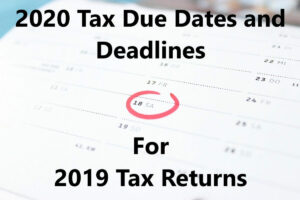
However, be sure to check whether your state conforms with the new guidance. Many states have made changes to their filing deadlines to align with the new federal tax deadline extension. Will the deadline for my state taxes also be extended? Remember, the sooner you file, the sooner you'll get any refund owed to you. The IRS has said it expects to continue processing refunds as normal and encourages all taxpayers to file as soon as possible. Like with individuals, this comes without interest or penalties for 90 extra days (April 15 to July 15) on any amount owed. How are corporations affected by the extension?Ĭorporations that operate on a calendar year have also been granted an automatic extension to file corporate tax returns and pay any tax due. This means your 2020 tax year first and second quarter estimated tax payments, previously due on April 15 and June 15, are now both deferred until July 15. This delay in payment comes interest- and penalty-free, for 90 days, until July 15, regardless of the amount owed.įurthermore, anyone who needs to make quarterly estimated tax payments also has until July 15 to submit these payments. The Treasury and IRS announced the deferment of filing your federal tax return as well as specific federal tax payments. The tax extension deadline generally applies to all calendar year tax-paying entities, including individuals, self-employed persons, and trusts and estates. How are individuals affected by the tax deadline extension? To understand how individuals (including self-employed individuals, trusts and estates) and corporations will be impacted by this tax deadline extension, read more below. Remember, as with all extensions you apply for, you'll still need to pay any estimated tax liability by July 15 or face underpayment penalties and interest charges.

While the automatic tax deadline extension doesn't require you to file Form 4868 to request the extension, you still have this option if you need more time (specifically until October 15, 2020). The average refund this year has topped $2,800, according to the IRS. However, taxpayers expecting a refund are still encouraged to file their tax returns as soon as possible so that they can receive their refunds. The three-month extension will automatically apply to calendar year filing individuals, inclusive of the self-employed, trusts and estates as well as C corporations. In March of 2020, the COVID-19 pandemic led the Treasury and IRS to delay when Americans are required to file their tax returns, calling for an automatic tax deadline extension to Jfor your 2019 taxes. To find your state's tax deadline, and to stay updated on the latest tax deadline information, please visit our blog post: " IRS Announced Federal Tax Filing and Payment Deadline Extension." 2020 Tax Deadline Extension Many state tax filing deadlines may change to reflect the federal deadline.

First and second quarter estimated tax payment deadlines are still April 15, 2021 and June 15, 2021.

The new federal tax filing deadline doesn't apply to 2021 estimated tax payments. But, you'll still need to pay any taxes you owe by May 17. If you file for an extension, you'll have until Octoto file your taxes. Individual taxpayers may defer tax payments until the new filing deadline, interest and penalty free. The new federal tax filing deadline is automatic, so you don't need to file for an extension unless you need more time to file after May 17, 2021. This extension also applies to 2020 tax payments.

Due to severe winter storms, the IRS has also extended the tax deadline for residents of Texas, Oklahoma and Louisiana to June 15, 2021. The federal tax filing deadline for 2020 taxes has been automatically extended to May 17, 2021. The Federal Emergency Management Agency (FEMA) declared certain regions in California, Georgia, and Alabama as federally declared disaster areas due to the disaster caused by recent storms and victims of these storms have until October 16, 2023, to file various individual and business tax returns and make certain tax payments.įor information on the third coronavirus relief package, please visit our “ American Rescue Plan: What Does it Mean for You and a Third Stimulus Check” blog post.


 0 kommentar(er)
0 kommentar(er)
